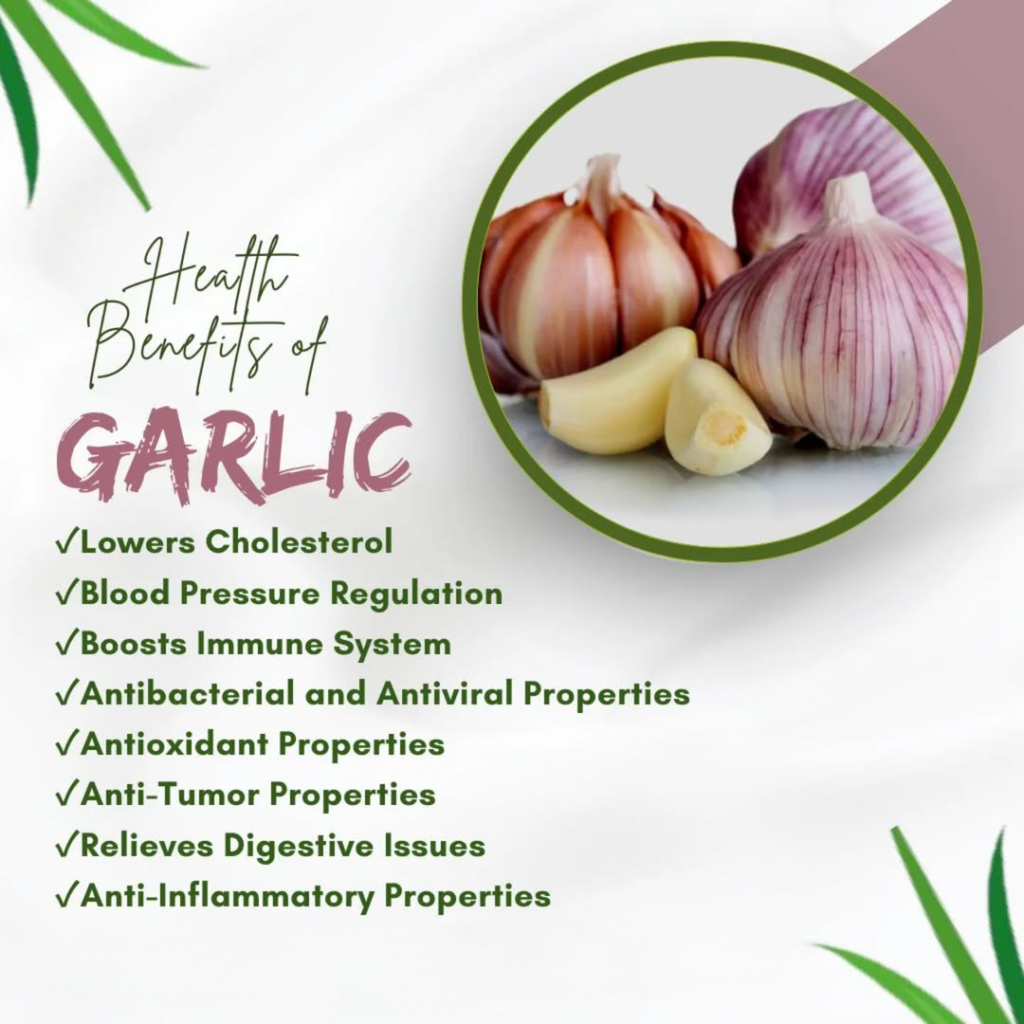Garlic, a humble kitchen staple, is more than just a flavor enhancer. It is packed with medicinal properties that have been cherished for centuries. From boosting immunity to promoting heart health, garlic is often referred to as a “superfood” due to its numerous health benefits. But what makes garlic so special?
Garlic: A Brief Overview
Garlic (Allium sativum) has been used for thousands of years in various cultures for both culinary and medicinal purposes. Ancient Egyptians, Greeks, Romans, and Chinese civilizations documented its powerful effects. Historically, garlic was even used to treat infections, wounds, and digestive disorders. Today, modern research continues to support its health benefits.
Nutritional Profile of Garlic
Garlic is rich in essential nutrients, including:
- Vitamins: Vitamin C, Vitamin B6
- Minerals: Selenium, Manganese, Calcium, Iron
- Compounds: Allicin (a powerful sulfur compound), Flavonoids, Antioxidants
These nutrients contribute to garlic’s health-boosting properties.
Garlic and Immune System Boosting
Garlic has been found to enhance immune function, making it a natural way to ward off colds and infections. Studies suggest that garlic can reduce the severity and duration of the common cold by stimulating the production of white blood cells.
Heart Health Benefits of Garlic
Garlic plays a crucial role in heart health by:
- Lowering blood pressure
- Reducing bad cholesterol (LDL)
- Preventing plaque buildup in arteries
These effects make garlic a valuable ally in preventing heart disease and stroke.
Garlic for Digestive Health
Garlic supports gut health by:
- Promoting the growth of beneficial gut bacteria
- Reducing bloating and gas
- Helping prevent stomach ulcers
It acts as a natural prebiotic, feeding good bacteria in your gut.
Garlic as a Natural Antibiotic
Garlic has potent antibacterial and antiviral properties. It is effective against various pathogens, including E. coli and Staphylococcus. Some studies suggest that garlic may even help fight antibiotic-resistant bacteria.
Garlic for Skin and Hair Health
Garlic benefits your skin and hair by:
- Treating acne due to its antibacterial properties
- Strengthening hair follicles to prevent hair loss
- Reducing dandruff and scalp infections
Applying garlic-infused oil can promote hair growth and improve scalp health.
Garlic and Anti-Inflammatory Properties
Garlic contains sulfur compounds that reduce inflammation, making it beneficial for:
- Arthritis pain
- Muscle soreness
- Chronic inflammatory conditions
Regular consumption can help alleviate symptoms of inflammation-related diseases.
Garlic’s Role in Weight Management
Garlic may aid weight loss by:
- Boosting metabolism
- Reducing appetite
- Enhancing fat burning
Studies suggest that garlic extract can help regulate fat storage and reduce body weight.
Garlic and Diabetes Management
Garlic can be beneficial for diabetics by:
- Lowering blood sugar levels
- Improving insulin sensitivity
- Reducing diabetes-related complications
Incorporating garlic into meals can support better blood sugar control.
Antioxidants in Garlic
Garlic is rich in antioxidants that protect against oxidative damage. These compounds help prevent premature aging and chronic diseases such as cancer and heart disease.
Garlic for Brain Health
Studies indicate that garlic may reduce the risk of neurodegenerative diseases like Alzheimer’s and dementia by preventing oxidative stress and inflammation in the brain.
How Garlic Supports Liver Health
Garlic helps detoxify the liver by activating liver enzymes that flush out toxins. It also protects against liver damage caused by excessive alcohol consumption or fatty liver disease.
Garlic and Cancer Prevention
Research suggests that garlic has anti-cancer properties. Its sulfur compounds may help inhibit cancer cell growth, particularly in cancers of the stomach, colon, and lungs.
How to Consume Garlic for Maximum Benefits
To maximize its health benefits, consider:
- Eating raw garlic for the highest allicin content
- Cooking garlic lightly to preserve nutrients
- Using garlic supplements if raw consumption isn’t an option
Side Effects and Precautions
While garlic is generally safe, excessive consumption may cause:
- Digestive discomfort
- Bad breath
- Blood-thinning effects (consult a doctor if on medication)
Garlic Supplements: Are They Effective?
Garlic supplements can be an alternative for those who dislike raw garlic. However, fresh garlic remains the most potent form.
Frequently Asked Questions About Garlic
Can I eat raw garlic every day?
Yes, but in moderation. One to two cloves per day is generally safe.
Does garlic help lower blood pressure?
Yes, studies show it can reduce blood pressure naturally.
Is garlic good for weight loss?
Yes, it boosts metabolism and reduces fat storage.
Can garlic cure infections?
Garlic has antimicrobial properties that help fight infections, but it should not replace medical treatment.
Does cooking garlic reduce its benefits?
Yes, prolonged cooking can destroy some beneficial compounds. Lightly cooking or eating it raw is best.
Can garlic interact with medications?
Yes, especially blood thinners. Consult a doctor if you take medication.
Conclusion
Garlic is a powerhouse of health benefits, from strengthening immunity to improving heart health. Whether eaten raw, cooked, or in supplement form, incorporating garlic into your daily routine can contribute to overall well-being.

